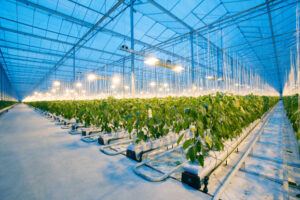Farmers have long known that the key to a successful crop is healthy soil. This suggests more than just knowing the right mix of nutrients to add to the soil; it also means maintaining the correct pH level. During this article, we’ll discuss why soil pH is so important in organic farming and the way you can maintain the ideal balance for your farm.
What is pH?
pH is a measure of how acidic or basic a substance is. The pH ranges from 0 to 14, with 0 being the foremost acidic and 14 being the most basic. 7 is neutral. Most plants grow best in soils with a neutral pH, though some plants prefer slightly acidic or slightly basic soils.
Organic farmers have to be aware of soil pH because it can affect how well plants grow and how nutrients are absorbed. For instance, if the soil is just too acidic, plants may have difficulty absorbing nutrients like phosphorus and magnesium. If the soil is just too basic, plants may have difficulty absorbing iron.
The ideal pH for most plants is between 6 and 7. to check your soil’s pH, you’ll purchase a testing kit at a gardening store or online. Once you recognize your soil’s pH, you’ll take steps to adjust it if necessary. For instance, if your soil is just too acidic, you’ll add lime to raise the pH. If your soil is just too basic, you’ll add sulfur to lower the pH.
The ideal pH for organic farming
Organic farmers have to be aware of the ideal pH for their crops. counting on the crop, the perfect pH can range from 5.5 to 7.0. The perfect pH will differ for each type of crop, so it’s important to consult a reliable source before making any adjustments to your soil.
While the perfect pH will differ for each crop, there are some general guidelines that each organic farmer should follow. First, your soil should be tested regularly to make sure that it is within the optimal range for your crops. Second, if your soil is just too acidic or alkaline, you’ll take steps to adjust it. This might involve adding lime or other amendments to raise the pH or adding sulfur or other amendments to lower the pH.
By following these guidelines, you’ll ensure that your soil is at the ideal pH for your crops. This may help you achieve optimal yields and produce healthy, high-quality crops.
The consequences of having an imbalanced pH
The pH of your soil can have a serious impact on the health of your plants. A pH that’s too high or too low can stunt growth, limit nutrient uptake, and encourage pests and diseases. That’s why it’s important to check your soil regularly and adjust the pH if necessary.
An imbalanced pH also can make it difficult for beneficial microbes to thrive. These microbes play a crucial role in breaking down organic matter and making nutrients available to plants. Without them, your plants are going to be less healthy and productive.
If you’re unsure how to adjust the pH of your soil, ask knowledgeable people at your local nursery or gardening store. they will help you find the right products and give you advice on how to use them.
How to raise or lower your soil's pH
The importance of soil pH in organic farming can’t be understated. A soil’s pH may be a measure of its acidity or alkalinity, and it can have a serious impact on the health of your crops. The perfect pH for most plants is between 6.0 and 7.0, but some plants (such as blueberries) prefer more acidic soil with a pH of 5.5 or lower.
If your soil’s pH is just too high or too low, it is often amended by adding either lime (to raise the pH) or sulfur (to lower the pH). However, it is vital to have your soil tested before you make any amendments, as adding an excessive amount of either substance can be just as harmful as having an improper pH in the first place.
Once you recognize the ideal pH for your plants, you’ll take steps to ensure that your soil is at the proper level for optimal growth. Healthy soil is the foundation of a healthy farm, so don’t neglect this important aspect of crop care!
Conclusion
The Importance of soil pH in Organic Farming is clear when you consider the fact that it directly affects the uptake of nutrients by plants. A high soil pH means plants will have difficulty absorbing nutrients, while low soil pH will make it easier for them to absorb nutrients. This is often why it is so important to test your soil’s pH levels and adjust them accordingly. By doing so, you’ll ensure that your plants are getting the optimal amount of nutrients, which can lead to healthier growth and larger yields.





Pingback: AGRICULTURE AUTOMATION FOR GOOD EFFICIENCY And PRODUCTIVITY. – TouchTECHNO